What are snow blower oils and how to fill them?

Winter is not only a time of fun outdoor games, but also a period of increased activity of all utilities and owners of private houses. Heavy snowfalls can paralyze the work of both a big city and a small village. Clearing snow, clearing sidewalks and roadways is hard physical labor, to facilitate which the designers have developed specialized equipment. One of the representatives of this device are snowblowers, the stable operation of which depends not only on the chosen model, but also on the type of oil used.


Oil requirements
Increased requirements for oil for snowblowers are caused by the low temperature conditions of the environment during operation, as well as unfavorable weather conditions. Among the most important properties of oil, experts identify the following:
- a high level of energy saving is the main indicator that affects the percentage of consumption during operation;
- an increased level of lubrication is a prerequisite that prolongs the life of the entire apparatus;
- the period of operation and preservation of the original properties is an indicator that affects the financial costs for the purchase of a new lubricant;
- versatility - a unique property that allows you to use the product for different types of engine;
- compatibility is an indicator, information about which is indicated on the engine and on the oil container.
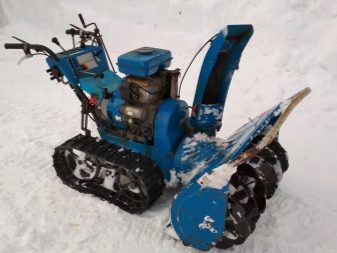

Winter engine oil should fulfill the following functions:
- fast lubrication of mechanisms in any climatic conditions;
- low speed of evaporation processes;
- obstacle to the rapid wear of parts;
- rust prevention;
- oxidation stability;
- lack of sludge and carbon deposits.
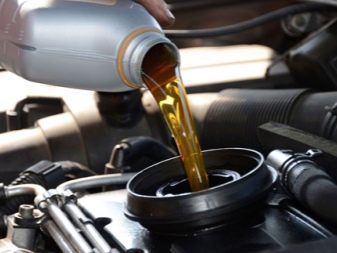

Views
The type of oil used depends on the type of engine that the manufacturer has installed on the snow blower. There are two models of engines:
- two-stroke;
- four-stroke.


Each of the above engines has its own technical parameters and features of the parts lubrication process.
The technical implementation of this procedure depends on the design features of the device and can be carried out directly by the owner of the device or occur automatically inside the engine. The design feature of the two-stroke engine provides for the use of a mixture of oil and gasoline, which are mixed in certain proportions. For automatic mixing of the liquid, the pump pumps combustible components from a special tank to the branch pipe.

The four-stroke engine uses a special system that uses oil and fuel separately. The unique lubrication system consists of a pump, filter, valve and supply line. For the first type of engine, it is necessary to use oils that, upon complete combustion, emit the least amount of soot, and the main properties of the oil for the second engine are to maintain the original parameters throughout the entire period of operation. Based on information about engine types, experts distinguish the following types of lubricating fluid:
- synthetic;
- semi-synthetic;
- mineral.
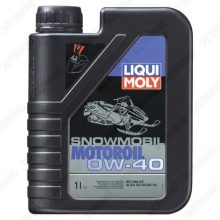


Mineral agent - raw material obtained after oil distillation and contains sulfur particles, which provokes oxidation of the metal surface. To reduce the negative effect of sulfur on the metal, manufacturers add various additives and synthetic components to the product. The advantage is the low price. Synthetic liquid is made by artificial method by combining various components. Advantages - high quality, versatility, high protective parameters, efficiency and the ability to use in difficult climatic conditions at maximum loads. The disadvantage is the high price range.


Semi-synthetic fluid consists of 70 percent mineral components and 30 percent artificial elements. This tool is the most popular and demanded due to the properties of natural and synthetic oils, as well as the affordable price range. Depending on the temperature regime of the environment, the following types of oils can be found:
- summer;
- winter;
- universal.
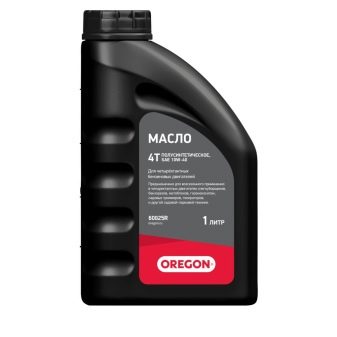

Particular attention should be paid to gear oil, which should not undergo oxidation processes, and also change its composition under the influence of low temperatures.
The main feature of a quality gear oil is economy and low evaporation. The presence of special additives has a beneficial effect on the structure of the fluid and prolongs its service life. You can purchase gear lubricant at any specialized automotive store.
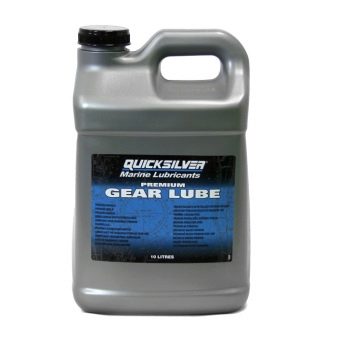

Selection recommendations
In specialized stores, you can see several types of oil for a snow blower, which have a number of individual characteristics. Experts recommend the following brands of oils.
- M - 82k Is a mineral type of lubricant that has a wide range of applications. The added additives not only significantly increase the oil change period, but also have a maximum pour point of more than 30 degrees above zero. Can be used for diesel engines.
- M - 8 M - a mineral liquid that is used for technology in different countries of the world. Advantages - high anti-corrosion performance, resistance to low temperatures, long-term operation, used in gasoline and diesel mechanisms.
- MT - 16p - oil for diesel vehicles. Advantages - protection of parts from corrosion, oxidation and wear.

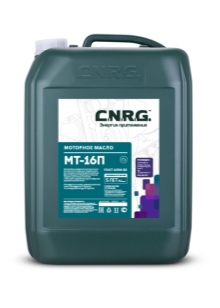

Particular attention must be paid to multi-purpose lubricants.
- RAVENOL Schneefraese 4-Takt 5W-30 - German artificial 4-stroke device. Advantages - slow evaporation, low consumption and oxidation, can be used without preheating the motor.
- Oregon SAE 30 - American semi-synthetic product for gasoline vehicles. Advantages - high level of cleaning, low percentage of consumption.
- MTD SAE 5W-30 - German mineral 4-stroke agent. Advantages - economy, use in a cold engine, engine protection from wear and corrosion.
- Craftsman SAE 5W-30 - a domestic mineral product, which is used for gasoline and diesel vehicles, significantly reduces the noise level, protects all parts from oxidation, rapid wear and corrosion.

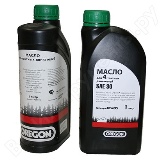


It is better to consult with experienced owners of this technique before buying.
Can I use an automobile?
If it is impossible to purchase a special engine oil for a snow blower, experts recommend using an automobile fluid, which has the following markings:
- 0W - for temperatures no more than 30 degrees below zero;
- 5W - for temperatures no more than 25 degrees below zero;
- 10W - for temperatures no more than 20 degrees below zero;
- 15W - for temperatures no more than 15 degrees below zero;
- 20 W - for temperatures no more than 10 degrees below zero.





Also, the types of engines must be the same - both the snow blower and the car. It is strictly forbidden to use summer car oil in winter.At the first opportunity, experts recommend that you must replace the car oil in the snow blower with a specialized lubricant.

How to fill in correctly?
For the stable operation of the snow blower, it is necessary not only to repair and replace parts on time, but also to fill in oil in a timely manner. This procedure consists of a set of rules that are binding. Oil filling stages:
- placing the device on a flat horizontal surface;
- starting the engine for a few minutes to warm up the old fluid;
- disconnecting the device;
- preparation of a container for waste liquid;
- draining oil through an open hole in the tank;
- closing the drain hole;
- removing the cover and dipstick from the neck;
- infusion of new oil;
- starting the device for a few minutes;
- checking the level of the new lubricant.


The oil change must be carried out not only in the engine, but also in the gearbox. Reducer - a part that is located between the moving mechanism and the auger. An oil change should be carried out every 60 hours of operation, as well as at the beginning and at the end of winter. Manufacturers produce two types of gearboxes:
- serviced - the device can be disassembled for revision;
- maintenance-free - a non-separable device that, in the event of a breakdown, needs to be completely replaced.
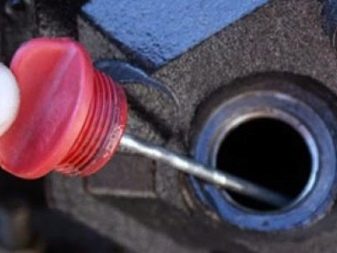
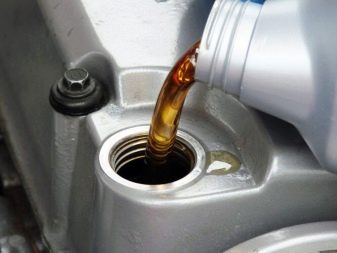
Two methods can be used to lubricate the gearbox:
- pouring liquid with a medical syringe into a special hole;
- lubrication of the disassembled mechanism.

The main stages of disassembling the gearbox:
- disconnecting the cover and the drive cable;
- unscrewing the bolts, which are located behind the flare for throwing off the snow;
- removing the auger belt from the pulley;
- dismantling the drive shaft bolts;
- recess of the auger and impeller;
- unscrewing the middle auger bolts;
- division of the gearbox into two parts.



Before carrying out an oil change, it is imperative to know the amount of fluid, the volume of which depends on the type of motor. The manufacturer indicates this information in the technical passport of the device. A small amount of lubricant will not provide full protection of the device, and an excess of lubricant will lead to its getting on the surface of candles and other elements of the device.
How often should you change?
All manufacturers in the instructions for their product recommend the most acceptable types of oil, as well as the frequency of its replacement. In the absence of this information, novice owners of equipment should definitely consult with experienced craftsmen. A standard oil change in a new device should be done after five hours of operation, the period of the second and third change can vary from 5 hours to 10 hours. All subsequent manipulations can be carried out after 55 hours of stable operation without exceeding the standard load norms. In conditions of low temperatures and high density of snow cover, change the lubricant after 35 hours. It is possible to completely drain and change the old oil only when the engine is warm. The frequency of changing the lubricant depends not only on the model of the snow blower, but also on the following factors:
- the total area of the territory;
- relief of the processed area;
- volume and density of snow cover;
- the presence of an ice crust.

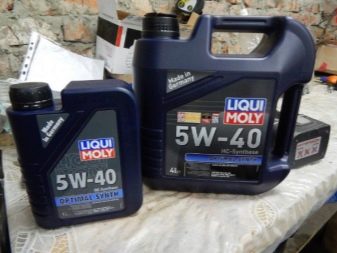
The use of innovative developments of designers can greatly facilitate the life of a modern person, which will make even snow removal an easy and exciting event. The main condition for the stable operation of the purchased equipment is timely and competent repair and replacement of the lubricating oil.

For information on how to properly change the oil in a snow blower, see the video below.



































































I watched the video to the end with pleasure. A very hard-working and very neat guy! Very rare! Happiness, health, good luck!
I don't know who how, but I take Garten-Wintergerate-Oil 5W-30 oil for snow blowers. True, it is not cheap, but there is nothing more to complain about, good oil in general.
The comment was sent successfully.